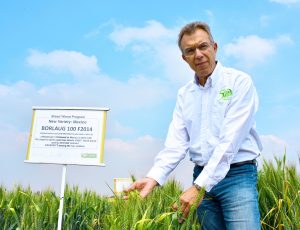Message from the Director General

This has indeed been a year of resilience, renewal, and transformation.
We began 2020 with grim news of the COVID-19 pandemic spreading from country to country, wreaking havoc on national economies, causing countless personal tragedies, and putting additional pressure on the livelihoods of the poor and hungry. The global crisis exposed the enormous vulnerability of our food system. If we have learned anything from the crisis, it is the absolute necessity to deliver science for renewed food systems that deliver affordable, sufficient, and healthy diets produced within planetary boundaries.
The dedication and resilience of the CIMMYT community this year allowed us to make important advances toward that vision.
Our decades-long joint work with the International Institute of Tropical Agriculture (IITA) was validated this year in a comprehensive review. Between 1995-2015, nearly 60% of all maize varieties released in 18 African countries were CGIAR-related, with yearly aggregate benefits from using post-1994 CGIAR-related varieties estimated in 2015 at between $660 million and $1.05 billion.
In just one year, through the Accelerating Genetic Gains in Maize and Wheat for Improved Livelihoods (AGG) project, CIMMYT and partners implemented rapid-generation breeding methods to shorten the wheat breeding cycle and developed three fall armyworm-tolerant elite maize hybrids for eastern and southern Africa.
Considered a game-changing partnership for smallholder Mexican farmers, the MasAgro project moved to a new level in 2020, with the support of the Mexican government. Today, more than 300,000 farmers grow maize, wheat and rotation crops with sustainable technologies on more than one million hectares across Mexico. Many collaborate with agri-food companies, providing fair wages to farmers and high-quality, sustainably produced maize and wheat products to customers.
The pandemic has seen many of us renew our working style. While we cannot replace our essential field and lab work, we will keep on meeting partners and colleagues partly online, a change that is certain to reduce our future ecological footprint.
Transformation is also occurring in our global research community. CIMMYT staff have been actively involved in working groups, task forces and communities of practice to support the One CGIAR transition. Personally, it has been an honor to co-lead the group of Directors General, funding partners, and science leaders to develop the foundation for the CGIAR 2030 Research and Innovation Strategy.
I want to close by expressing my deepest gratitude to the staff, partners, and community of CIMMYT who overcame unprecedented challenges this year. Thank you to CIMMYT staff and research partners, especially those working in the field and labs, who went above and beyond their usual activities and work schedules to keep CIMMYT’s core business going. Thank you to our funding partners for believing in our mission. To those juggling care for children and ill family members with the challenges of working remotely. To those managing CIMMYT’s crisis response across the countries where we work. To those who have remained committed — both in their work and in their minds — to CIMMYT’s mission. And I wish to express my sincere condolences for the CIMMYT family members who lost their lives to this dreadful pandemic.
I invite you to read this report and join me in continuing to actively work towards resilience, renewal, and transition in our work and in our agri-food systems, to ensure that they are strong in the face of current and future crises.
